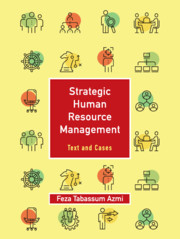Book contents
- Frontmatter
- Dedication
- List of Figures
- List of Figures
- List of Tables
- Preface
- Acknowledgements
- PART I The Framework of Strategic Human Resource Management
- PART II Context of SHRM
- PART III Strategy Formulation
- 4 Strategy Formulation and HRM
- 5 Workflow Analysis and Strategic Job Analysis
- PART IV Strategy Implementation
- PART V Strategy Evaluation
- Index
5 - Workflow Analysis and Strategic Job Analysis
from PART III - Strategy Formulation
Published online by Cambridge University Press: 26 April 2019
- Frontmatter
- Dedication
- List of Figures
- List of Figures
- List of Tables
- Preface
- Acknowledgements
- PART I The Framework of Strategic Human Resource Management
- PART II Context of SHRM
- PART III Strategy Formulation
- 4 Strategy Formulation and HRM
- 5 Workflow Analysis and Strategic Job Analysis
- PART IV Strategy Implementation
- PART V Strategy Evaluation
- Index
Summary
Chapter Overview
This chapter focuses on discussing the concepts of workflow analysis and job analysis. It discusses the significance, purpose, and steps involved in workflow and job analysis. Furthermore, it carries out a discussion on the shift in concept and practice from traditional job analysis to strategic job analysis. Themes such as dejobbing, strategic job modelling (SJM), and competency mapping are discussed in the light of strategic job analysis.
Learning Objectives
To get familiarized with the concepts of workflow analysis and job analysis
To develop an understanding of the need, significance, purpose, and outcomes of workflow analysis and job analysis
To understand the rationale of why and how traditional job analysis has evolved into strategic job analysis
To understand concepts such as dejobbing, SJM, and competency mapping in the light of strategic job analysis
OPENING STORY
The Future of Work
The world of work is undergoing a major process of change. There are several forces transforming it, from the onward march of technology and the impact of climate change to the changing character of production and employment, to name a few. In order to understand and to respond effectively to these new challenges, the International Labour Organization (ILO) has launched a ‘Future of Work’ initiative. The ILO understands the need to respond effectively to the world of work and ongoing changes in order to be able to advance its mandate for social justice.
The Future of Work initiative is the centrepiece of the ILO's activities to mark its centenary in 2019.
Future of Work initiative timelines
2016: A broad framework is needed to give the Future of Work initiative the necessary structure and focus for concrete results to be obtained. In 2016, all ILO member states are invited to undertake national ‘Future of Work’ dialogues structured around four ‘centenary conversations’:
• Work and society
• Decent jobs for all
• The organization of work and production
• The governance of work
2017–2018: In 2017, a high-level Global Commission on the Future of Work will be established. Its purpose will be to examine the output from the national dialogues and other input it may consider necessary. The commission will publish a report and recommendations in the course of 2018.
- Type
- Chapter
- Information
- Strategic Human Resource Management , pp. 127 - 154Publisher: Cambridge University PressPrint publication year: 2019



